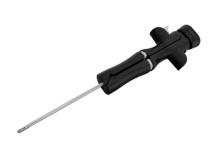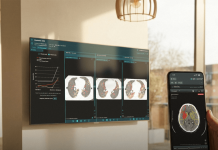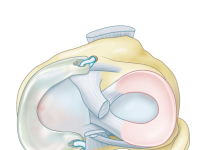Navigation Sciences announced it has received a $400,000, Phase 1, Small Business Technology Transfer (STTR) grant from the National Cancer Institute (NCI) to support the development of key technology for its NaviSci™ System for precision surgical resection of lung tumors.
“The NCI grant, the second one we have received for the NaviSci System, is an important validation of our approach and of the growing clinical need for new precision surgical technology in lung cancer,” said Alan Lucas, Navigation Sciences CEO. “We are developing the NaviSci System to address a significant, growing clinical need to reliably localize small, non-palpable tumors and resect them with sufficient margins to ensure removal of all tumor tissue and thereby reduce local recurrence risk.”
Related: Axon Therapies raises $32m funding to transform heart failure treatment
Mr. Lucas noted that the number of small tumors diagnosed at an early stage (Stage 1 and 2) in the U.S., where surgery is potentially curative, is growing rapidly as a result of increased screening reimbursement coverage. By 2028, according to industry and company estimates, early-stage tumors are expected to account for 67 percent of diagnosed nodules. Although tissue-sparing surgery such as segmentectomy has emerged as the preferred approach over lobectomy for these tumors, it is associated with a higher local recurrence rate.
Achieving adequate margins is challenging for the resection of small tumors because they are identified in an inflated lung with CT imaging prior to surgery and then deflated for the procedure. The NaviSci System is designed to provide real-time navigation for tumor localization and resection intraoperatively in the presence of lung tissue deformation. The System’s key innovation is the use of an active nodule marker, called a J-Bar, with an electromagnetic sensor placed percutaneously near the tumor that is paired to a second sensor on the cutting instrument.
The grant will support the development of a software system (EndoNaviSci™) to guide accurate J-Bar deployment close to the nodules using diagnostic CT images from an inflated lung and determine the cutline distance in the deflated lung during surgery.
The company is collaborating on the grant with researchers at Brigham & Women’s Hospital, including Navigation’s scientific co-founders, Jayender Jagadeesan, PhD, Principal Investigator, and Raphael Bueno, MD, Co-investigator. Larry Roth, Navigation’s Vice President of Product Development, is also a Co-investigator. The grant is entitled, “Targeted localization and Optimized Surgical Resection for Lung Cancer.”




